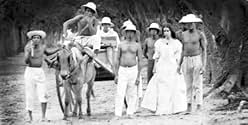Escrava Isaura
- Série télévisée
- 1976–1977
- 26m
Ajouter une intrigue dans votre langueThe difficulties faced by a gentle-hearted young white slave targeted by the obsession of her lord in the Brazilian colonial period.The difficulties faced by a gentle-hearted young white slave targeted by the obsession of her lord in the Brazilian colonial period.The difficulties faced by a gentle-hearted young white slave targeted by the obsession of her lord in the Brazilian colonial period.
































